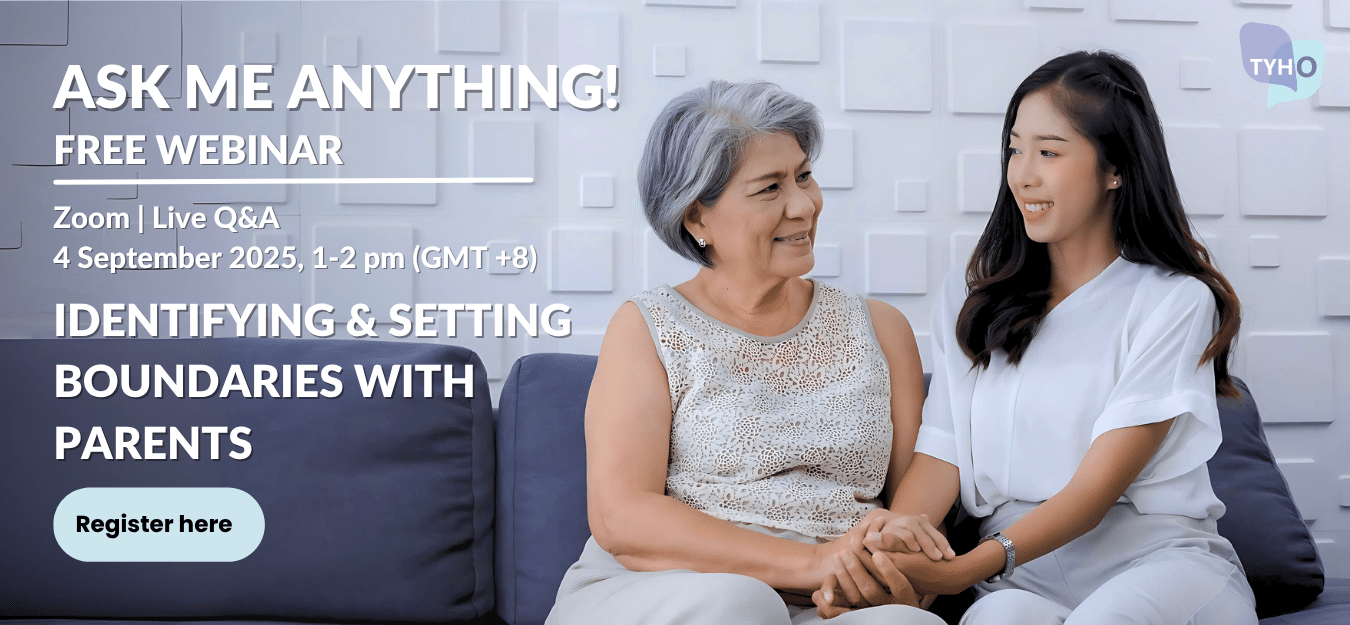Anger Management
Find a qualified counsellor to talk to today!
At TYHO, we prioritise that you receive the highest quality anger management therapy in Singapore.
- Singapore-based counselling platform
- 98% of our clients would recommend TYHO
- Strict selection process with 10% acceptance rate for counsellors
- Online & In-person (various locations)
- 70+ vetted & multicultural counsellors in Singapore
- Same day & after hours (incl weekend) sessions available

Our Counsellors Who Can Help
Have you considered online anger management counselling? Below are some of our anger management Therapists who may be able to assist.

Shermaine
Anger Management Therapist
- TYHO Counselling Centre (City Hall)
Shermaine can help individuals facing issues like low moods or depression, unemployment, communication problems, work-related stress or burnout, childhood trauma / ACE.
Starting from S$ 174.40 (w/GST)

Krish
Anger Management Therapist
Krish can work with individuals and couples facing trauma, addictions, LGBTQIA+ issues, relationship or marriage issues, and mood disorders.
Starting from S$ 130.80 (w/GST)

Gwendolyn
Anger Management Therapist
- Multiple Addresses
Gwendolyn works with individuals facing life challenges, relationships with parent(s), unhealthy coping mechanisms, self-esteem, and pregnancy-related issues.
Starting from S$ 130.80 (w/GST)

Alexandra
Anger Management Therapist
- Multiple Addresses
Alexandra is a psychologist who draws on her multicultural experiences to support clients facing relationship, workplace, and self-esteem issues.
Starting from S$ 239.80 (w/ GST)

Sandra
Anger Management Therapist
- TYHO Room (Tanjong Pagar)
Sandra can work with individuals facing anxiety (incl social anxiety), panic attacks, relationship issues, bipolar disorder, and fears or phobias.
Starting from S$ 130.80 (w/GST)

June
Anger Management Therapist
June is able to work with individuals facing depression, anxiety, family relationships, trauma, and dementia.
Starting from S$ 174.40 (w/GST)

Helen
Therapist
- TYHO Room (City Hall)
Helen can help individuals and couples with life transitions, anxiety (incl social anxiety), work-related stress or burnout, communication problems, and fears or phobias.
Starting from S$ 174.40 (w/GST)

Savrina
Anger Management Therapist
- Multiple Addresses
Savrina can work with individuals facing cultural adjustment, harassment or bullying, financial stress, control, violence, or abuse, and LGBTQ+ issues.
Starting from S$ 130.80 (w/GST)

Evonne
Therapist
Evonne provides counselling to adolescents and individuals facing anxiety, stress, depression, LGBTQ-related issues, cultural adjustment, and grief.
Starting from S$ 130.80 (w/GST)

Avanti
Therapist
- TYHO Room (Tanjong Pagar)
Avanti is able to help clients facing anxiety, depression, panic attacks, trust issues, and financial stress.
Starting from S$ 130.80 (w/GST)

Connie
Therapist
Connie is an experienced counsellor and works with individuals on a variety of issues such as stress, anxiety, cultural adjustment and LGBTQ issues.
Starting from S$ 130.80 (w/GST)

Patrice
Anger Management Therapist
Patrice specialises in counselling for anxiety, depression, life transitions, marriage / couples counselling and trauma-related issues.
Starting from S$ 130.80 (w/GST)

Alexis
Anger Management Therapist
Alexis can work with individuals facing anxiety, depression, cultural adjustment, LGBTQ+ issues, and ADHD.
Starting from S$ 130.80 (w/GST)

Joanne
Anger Management Therapist
Joanne can work with individuals facing issues with anxiety (incl social anxiety), trauma, communication problems, eating concerns or body image, and fears or phobias.
Starting from S$ 130.80 (w/GST)

Diana
Anger Management Therapist
Diana can work with individuals facing unhealthy coping mechanisms, intrusive thoughts, anger management, LGBTQ+ issues, and PTSD.
Starting from S$ 174.40 (w/GST)

Krisna
Anger Management Therapist
- TYHO Counselling Centre (City Hall)
Krisna can work with adolescents and adults facing anxiety (incl social anxiety), unhealthy coping mechanisms, loneliness, cultural adjustment, and self-esteem.
Starting from S$ 174.40 (w/GST)

Aneel
Anger Management Therapist
- TYHO Room (Tanjong Pagar)
Aneel can work with individuals facing issues with anxiety (incl social anxiety), intergenerational trauma, financial stress, narcissism, and grief, separation & loss.
Starting from S$ 130.80 (w/GST)

Natasha
Anger Management Therapist
- TYHO Counselling Centre (City Hall)
Natasha can work with individuals facing issues with harassment or bullying, relationship with parent(s), cultural adjustment, PTSD, and LGBTQ+ issues.
Starting from S$ 174.40 (w/GST)

Jude
Anger Management Therapist
Jude can work with individuals facing issues with panic attacks, parental stress, unemployment, childhood trauma / ACE, and addictions.
Starting from S$ 130.80 (w/GST)
Understanding Anger
Anger is a common emotion we all face at some point in our lives. The emotion is rooted in our very survival, and it usually manifests when someone or something treats us unfairly and when we have little or no power to do anything about it.
However, anger can also stem from other internal emotional conflicts such as sadness, feelings of frustration, mood swings, and irritability.
Anger can be good, as it can inspire or motivate you to find solutions to problems. However, excessive and unregulated (ie lashing out or projecting your anger at someone who didn’t cause harm) can cause conflicts in relationships and personal life.
Moreover, uncontrollable anger can also trigger past trauma, depression, frustration, feeling emotional all the time, and a deep helplessness of not being able to control or understand your emotions.
Anger manifests differently among everyone. While some people may completely avoid the situation or person when angry, others may tend to be more confrontational.
How we act on our anger has a huge role to play in all aspects of life. For example, if an angry person lashes out at someone or resort to violence, it can be problematic. Anger such as that could also cloud a person’s judgement and affect their decision-making abilities.
Hence, anger management therapy is a service Talk Your Heart Out (TYHO) offers for anyone who may be struggling to manage their anger. Read the next section to see some of the most common signs of anger.
Signs of Anger Issues
Anger can show up through emotional distress or physical symptoms. Anger only becomes an issue when it affects your daily life and how you interact with others.
In fact, your anger might cause you to behave in a way that you otherwise wouldn’t.
Identifying the subtle differences between characteristics of anger and signs of anger issues could help you seek help at the right time.
You might be struggling with anger issues if you notice the following patterns in your behaviour:
- You lose your temper often and quickly over small incidents (eg arguing with a partner)
- You often feel the need to control your anger
- You cannot express yourself without shouting at someone
- You frequently argue with family, friends, or colleagues
- You break or damage objects when you get angry
- You threaten physical harm to yourself or the people around you
- You get into physical altercations with strangers or loved ones
- You often get in trouble with the law due to your anger
- You have road rage and tend to drive recklessly when angry
The Causes of Anger
Below are some of the most common causes of anger:
Frustration: When you are stopped from achieving a goal, cannot fulfil your personal and social needs, or struggle to express your emotions, you might feel frustrated. When these obstacles are unavoidable – your frustration may turn into anger.
Disappointment: You may become angry when you are disappointed, especially in yourself or your loved ones. You might feel disappointed due to various situations, such as failing an exam or seeing your friends distance themselves from you without a specific reason or having no friends.
Poor communication: Miscommunication, or lack of communication in your relationships (ie platonic and romantic) can cause anger. Lack of open communication is especially common among partners. Along with anger management counselling, at TYHO, we provide couples counselling in Singapore for anyone struggling with relationship issues.
Stress: High levels of work-related, financial, familial, or personal stress can cause or trigger anger. Stress responses can make you more reactive and less efficient in managing your emotions.
Feeling belittled: If you feel disrespected or humiliated by someone, you may feel intense anger. Belittling can significantly affect one’s self-esteem and dignity. If someone wronged you and you find it hard to confront the situation in a healthy way, please reach out to TYHO for anger management in Singapore.
Hurt of pain: Emotional and physical pain can cause anger. Emotional pain could include going through a breakup, losing a loved one, or betrayal. On the other hand, physical pain could include issues such as chronic muscle pain or injuries.
Fear: When you feel scared, anger may act as a defensive response to the threat. Most times, anger caused by fear protects us from perceived danger. However, it can also lead to other problems, such as low self-esteem or trust in oneself.
You may feel anger due to one or more of the above-mentioned causes. People usually have different thresholds for anger based on their personality and life experiences.
For example, some people may feel angry due to disappointment, while others could easily move on.
Hence, regardless of the causes, if you feel like your anger is taking control of you, you might benefit from anger management therapy.
The 3 Types of Anger
Anger is complex in nature, and it can help you understand it better if we classify it based on the most common types.
The three common types of anger are passive, assertive, and aggressive.
1. Passive Anger
When you don’t necessarily express your anger verbally or otherwise, you might experience passive anger.
Instead of being confrontational, you may suppress your emotions and express your anger through passive-aggressive actions such as avoiding, guilt-tripping, giving the ‘silent treatment’ (ie refusing to talk to the person when they attempt to converse), or being sarcastic.
These repressed feelings of anger could make you stressed, resentful, or powerless.
For example, if a coworker belittles you or blames you for something, you might express your anger by missing deadlines, intentionally avoiding work assigned to you, or turning off work-related gatherings.
While passive anger may seem less harmful because it is not as obvious, you might struggle to maintain or develop relationships with your friends or colleagues.
2. Assertive Anger
Assertiveness is a trait where you can stand up for yourself and share your emotions without being aggressive or passive.
Similarly, expressing your emotions directly and respectfully (ie, being honest, communicating, sharing your needs) is known as assertive anger (or constructive anger).
Assertive anger is healthy and can help you solve your problems effectively.
For example, if you are upset because your friend cancelled plans at the last minute, you would say something like, “I’m upset that we had to cancel our plan at the last minute, but next time, could you let me know beforehand about a change of plans?”
3. Aggressive Anger
When you are unable to control your anger and often express your emotions by dominating or hurting others (emotionally or physically), you may have aggressive anger.
Aggressiveness can be explosive and destructive, ruin your relationship with others, and feel disappointed with yourself.
For example, if you are angry, you may lash at someone, throw insults, threaten or physically harm someone else. You may be triggered even by small incidents, such as being stuck in traffic.
Uncontrollable anger can cause harm to both you and the person at the receiving end. If you relate to this type of anger, TYHO Therapists in Singapore can help you manage your emotions, express healthily, and heal previously affected relationships through anger management therapy.
Myths and Facts About Anger
Management
Note: At TYHO, we use the term ‘Therapists’ to collectively refer to psychologists, counsellors, and psychotherapists in Singapore.
TYHO anger management counsellors use several evidence-based therapeutic approaches, such as cognitive behavioural therapy (CBT) and mindfulness-based intervention, to help you:
- Manage and control anger
- Address anger problems directed/projected at a romantic partner and/or children
- Resolve conflicts and arguments in a constructive way
- Identify triggers of anger
- Observe the impact of anger in various aspects of your life
Anger management counsellors also provide tools to help you develop a healthy lifestyle and habits that could help manage uncontrollable emotions.
Therapeutic tools could include regular therapy homework, tracking your emotions and mood swings, or using relaxation techniques.
TYHO Therapists provide long-term support through anger management in Singapore. We have a 10% acceptance rate and ensure to select only those professionals who align with TYHO’s core values. Our values include empathy, understanding, and open-mindedness.
Hence, be assured that your Therapist will provide a non-judgmental space for you to share your feelings and concerns.
Read this section to understand more about our anger management therapy.
What Is Anger Management Counselling?
Professional anger management in Singapore can help address issues that may be causing disproportionate anger or rage to triggers (eg exploring how abandonment in childhood leads to uncontrollable anger).
Anger management in Singapore can benefit you if you feel like you have little control over your temper and find that your anger negatively affects your quality of life.
At TYHO, anger management Therapists help you to:
- Recognise early signs of chronic anger
- Identify your triggers and learn how to manage them
- Learn how to express your needs appropriately
- Discover and apply techniques to manage your anger healthily
- Develop an effective communication style to express your emotions
- Enhance your personal and professional relationships
Anger issues rarely exist in isolation and can be caused by underlying mental health disorders such as bipolar disorder or post-traumatic stress disorder (PTSD).
If left unresolved, anger can result in negative coping strategies such as alcohol or drug dependencies.
Working with an anger management counsellor in Singapore to manage anger can significantly improve your mental health and bring a sense of calm into your life.
What Therapies Work for Anger?
What therapy modalities work for anger depends on the intensity of your issue and your therapy goals.
In general, anger management Therapists at TYHO are highly qualified (with a minimum of master’s in counselling or psychology) and skilled in approaches such as:
- Cognitive-behavioural therapy (CBT)
- Psychodynamic therapy
- Dialectical behaviour therapy (DBT)
- Family therapy
1. Cognitive Behavioural Therapy (CBT)
CBT is a psychotherapeutic treatment that helps people learn how to recognise and modify destructive thought patterns that lead to troublesome emotions, such as anger.
This type of anger management in Singapore involves exploring the interconnection between thoughts, feelings, and behaviours. The premise is that our thoughts about a situation affect our response – and that response could either be emotional, behavioural, or both.
For example, if their coworkers’ actions frequently anger someone, their Therapist would guide them to identify the triggers and their interpretations. The person would then explore alternative, more balanced ways of interpreting these situations.
Instead of thinking, “My coworker is intentionally trying to annoy me,” the person might learn to think, “My coworker might be having a stressful day, and their action is not related to me,” thereby reducing the intensity of their anger.
2. Dialectical Behaviour Therapy (DBT)
Dialectical behaviour therapy is a sub-type of cognitive-behavioural therapy that emphasises the psychosocial aspects of treatment.
Anger management in Singapore through DBT helps people regulate their emotions and enhance their interpersonal relationships through skills training in areas like mindfulness, distress tolerance, emotion regulation (eg rediscovering joy and happiness), and interpersonal effectiveness.
Let’s consider an individual who often reacts angrily to criticism. In DBT, this person would learn mindfulness techniques to become more aware of their anger and its triggers.
They will develop distress tolerance strategies to manage their immediate emotional response and emotion regulation techniques to reduce their vulnerability to anger. They would also learn interpersonal effectiveness skills to express their feelings assertively.
3. Psychodynamic Therapy
Psychodynamic therapy focuses more on negative childhood experiences and how they affect one’s emotions and responses.
During therapy, the client may explore their repressed emotions, past issues, triggers and causes of their anger.
For example, through the help of an anger management Therapist, the person might realise that their anger is often a defence reaction in response to feeling unloved. With that in mind, the Therapist might use tools such as ‘Content Vs. Process’.
The content part is what the client communicates and understands about their feelings from a conscious level. In contrast, the process part is how the Therapist received the information, which may give the Therapist an insight into what the client is trying to communicate outside of immediate awareness.
At TYHO, our anger management Therapists use several different types of tools from psychodynamic therapy, such as transference and countertransference.
4. Family Therapy
Family therapy focuses on the idea that individual issues, such as uncontrollable anger, can only be understood and managed within the family system/structure in which they occur.
At TYHO, family counselling in Singapore can help:
- Improve communication within the family
- Understand how one person’s anger affects other members
- Resolve conflicts in a healthy way
During anger management in Singapore for families, the Therapist may also work on helping the client understand how family roles, rules, and expectations can trigger anger.
What Is the Best Therapy for Anger Management?
The best anger management therapy may depend on:
- Your unique circumstances
- Intensity of anger
- Personal preferences
- Reasons for your anger
- Your Therapist’s specialisations
However, according to research, cognitive behavioural therapy (CBT) was found to be the most common, time-limited, and effective treatment for anger issues.
At TYHO, many psychologists in Singapore have experience and expertise with CBT.
The four most common CBT interventions used by anger management counsellors when treating anger management issues include:
- Relaxation techniques
- Cognitive interventions
- Communication skills
- Combined interventions
Relaxation methods can help address the emotional and psychological factors of anger, such as feeling frustrated or aggressive.
Your anger management counsellor might use cognitive interventions to help you become more aware of your triggers. Additionally, you may also explore maladaptive behaviours and beliefs and unhelpful thinking patterns.
During therapy, your Therapist may also focus on helping you improve your communication skills. Learning how to express yourself openly could help you become assertive and develop conflict-resolution skills.
Lastly, your Therapist may combine one or more therapeutic interventions to focus on multiple response areas.
For example, you may use distress tolerance techniques (from dialectical behaviour therapy) to learn how to overcome distressing emotions while changing how you think about the situation (ie cognitive restructuring from CBT).
Your Therapist will work with you to determine the best therapeutic plan for your unique situation.
What to Expect in Anger Management Counselling
TYHO anger management Therapists may use psychotherapy (or talk therapy) to help you manage and control your anger.
In this section, we provide information on what you can expect during anger management counselling at TYHO.
1. Identifying Your Triggers
In the first few sessions of therapy, your anger management Therapist might conduct an assessment to get to know you better.
The assessment could include questions about your childhood memories, experiences with anger, past or current relationships affected due to anger, your family history, and questions about your mental health.
Your Therapist may also discuss any co-existing mental or physical health issues that may be negatively affecting your life.
Try to be as honest as possible, as what you share can help your Therapist tailor the therapeutic plan to match your needs.
2. Developing a Personalised Therapeutic Plan
After building rapport and developing a positive therapeutic relationship with you, your anger management counsellor may focus on creating a therapeutic plan.
You will be working with your Therapist to set several goals, including:
- Personal goals
- What you want out of therapy
- Which areas you want to focus on
- What kind of approach works for you
During this stage, your counsellor may also discuss the frequency of your therapy sessions and set a timeframe for when you can expect to progress in therapy.
3. Understanding the Root Causes
The first step to getting started with therapy is identifying why you are feeling anger and why you’re unable to control it.
Hence, your Therapist will explore factors such as:
- Unresolved trauma (including emotional and physical abuse)
- Negative thought patterns
- Coping mechanisms
The goal is to identify the reason and triggers behind your anger.
4. Learning Effective Coping Mechanisms
An essential part of psychotherapy for anger is learning techniques to manage your anger effectively.
These might include breathing exercises, relaxation techniques, cognitive restructuring (changing the way you think about certain situations), problem-solving, and improving communication skills.
You may be given the space to practice these techniques during your sessions and also encouraged to use them outside of therapy.
5. Receiving Regular Progress Reviews
As you attend therapy, your anger managemet counsellor will regularly review your progress with you.
Regular reviews give you the opportunity to discuss any changes you have noticed, challenges you are facing, and adjustments that may need to be made to your treatment plan.
6. Ensuring Your Confidentiality
Psychotherapy sessions are confidential, meaning that what you discuss with your Therapist stays between you and them.
There are only a few exceptions to this rule, such as when there’s a risk of harm to yourself or others.
7. Gaining Long-Term Support
Seeing progress during anger management therapy requires commitment.
Therapy is not a quick fix; you may have to work through some difficult emotions and memories to progress.
Please be assured that TYHO Therapists prioritise you and are committed to providing you with long-term care.
Over several sessions, you will eventually begin to notice changes in how you manage your anger, relationships, and overall quality of your life.
Some people may notice progress after a few sessions, while others may take more time. It is completely okay to take things at your own pace.
Feel free to talk to your Therapist about anything that may be bothering you or even if something works out for you really well (ie you can provide feedback to your psychotherapist if mindfulness exercises work better than CBT or vice versa).
Remember, you can get the most out of therapy when you focus on building a healthy relationship with your Therapist and participating actively in therapy sessions!
Reach out to us via email at [email protected] or via WhatsApp (click the WhatsApp icon at the bottom right) if you need help selecting a Therapist.
Know the signs.
More Services
Subscribe to Our Newsletter
Interested in joining our newsletter and staying connected?
Drop your email address below to receive mental health news, latest TYHO articles, and tips delivered to your inbox monthly.


